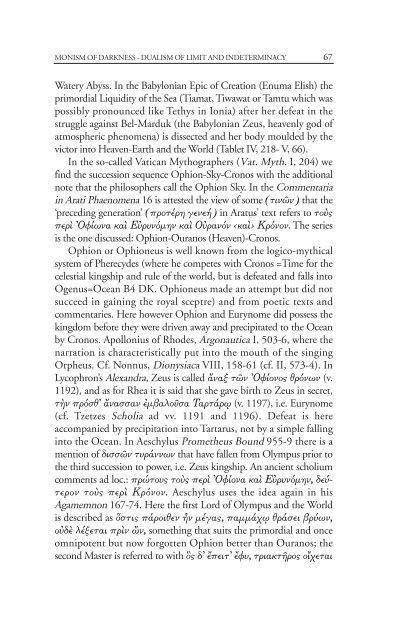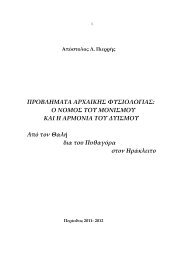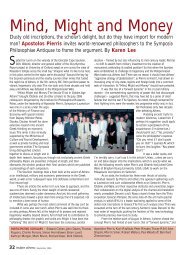chapter 10 the monism of darkness and the dualism of limit and ...
chapter 10 the monism of darkness and the dualism of limit and ...
chapter 10 the monism of darkness and the dualism of limit and ...
You also want an ePaper? Increase the reach of your titles
YUMPU automatically turns print PDFs into web optimized ePapers that Google loves.
MONISM OF DARKNESS - DUALISM OF LIMIT AND INDETERMINACY 67<br />
Watery Abyss. In <strong>the</strong> Babylonian Epic <strong>of</strong> Creation (Enuma Elish) <strong>the</strong><br />
primordial Liquidity <strong>of</strong> <strong>the</strong> Sea (Tiamat, Tiwawat or Tamtu which was<br />
possibly pronounced like Tethys in Ionia) after her defeat in <strong>the</strong><br />
struggle against Bel-Marduk (<strong>the</strong> Babylonian Zeus, heavenly god <strong>of</strong><br />
atmospheric phenomena) is dissected <strong>and</strong> her body moulded by <strong>the</strong><br />
victor into Heaven-Earth <strong>and</strong> <strong>the</strong> World (Tablet IV, 218- V, 66).<br />
In <strong>the</strong> so-called Vatican Mythographers (Vat. Myth. I, 204) we<br />
find <strong>the</strong> succession sequence Ophion-Sky-Cronos with <strong>the</strong> additional<br />
note that <strong>the</strong> philosophers call <strong>the</strong> Ophion Sky. In <strong>the</strong> Commentaria<br />
in Arati Phaenomena 16 is attested <strong>the</strong> view <strong>of</strong> some (ÙÈÓáÓ) that <strong>the</strong><br />
‘preceding generation’ (appleÚÔÙ¤ÚË ÁÂÓ‹) in Aratus’ text refers to ÙÔf˜<br />
appleÂÚd \OÊ›ˆÓ· ηd EéÚ˘ÓfiÌËÓ Î·d OéÚ·ÓfiÓ KÚfiÓÔÓ. The series<br />
is <strong>the</strong> one discussed: Ophion-Ouranos (Heaven)-Cronos.<br />
Ophion or Ophioneus is well known from <strong>the</strong> logico-mythical<br />
system <strong>of</strong> Pherecydes (where he competes with Cronos =Time for <strong>the</strong><br />
celestial kingship <strong>and</strong> rule <strong>of</strong> <strong>the</strong> world, but is defeated <strong>and</strong> falls into<br />
Ogenus=Ocean B4 DK. Ophioneus made an attempt but did not<br />
succeed in gaining <strong>the</strong> royal sceptre) <strong>and</strong> from poetic texts <strong>and</strong><br />
commentaries. Here however Ophion <strong>and</strong> Eurynome did possess <strong>the</strong><br />
kingdom before <strong>the</strong>y were driven away <strong>and</strong> precipitated to <strong>the</strong> Ocean<br />
by Cronos. Apollonius <strong>of</strong> Rhodes, Argonautica I, 503-6, where <strong>the</strong><br />
narration is characteristically put into <strong>the</strong> mouth <strong>of</strong> <strong>the</strong> singing<br />
Orpheus. Cf. Nonnus, Dionysiaca VIII, 158-61 (cf. II, 573-4). In<br />
Lycophron’s Alex<strong>and</strong>ra, Zeus is called ôÓ·Í ÙáÓ \OÊ›ÔÓÔ˜ ıÚfiÓˆÓ (v.<br />
1192), <strong>and</strong> as for Rhea it is said that she gave birth to Zeus in secret,<br />
ÙcÓ appleÚfiÛı’ ôÓ·ÛÛ·Ó âÌ‚·ÏÔÜÛ· T·ÚÙ¿Úˇˆ (v. 1197), i.e. Eurynome<br />
(cf. Tzetzes Scholia ad vv. 1191 <strong>and</strong> 1196). Defeat is here<br />
accompanied by precipitation into Tartarus, not by a simple falling<br />
into <strong>the</strong> Ocean. In Aeschylus Prome<strong>the</strong>us Bound 955-9 <strong>the</strong>re is a<br />
mention <strong>of</strong> ‰ÈÛÛáÓ Ù˘Ú¿ÓÓˆÓ that have fallen from Olympus prior to<br />
<strong>the</strong> third succession to power, i.e. Zeus kingship. An ancient scholium<br />
comments ad loc.: appleÚÒÙÔ˘˜ ÙÔf˜ appleÂÚd \OÊ›ÔÓ· ηd EéÚ˘ÓfiÌËÓ, ‰Â‡-<br />
ÙÂÚÔÓ ÙÔf˜ appleÂÚd KÚfiÓÔÓ. Aeschylus uses <strong>the</strong> idea again in his<br />
Agamemnon 167-74. Here <strong>the</strong> first Lord <strong>of</strong> Olympus <strong>and</strong> <strong>the</strong> World<br />
is described as ¬ÛÙȘ apple¿ÚÔÈıÂÓ qÓ Ì¤Á·˜, apple·ÌÌ¿¯ˇˆ ıÚ¿ÛÂÈ ‚Ú‡ˆÓ,<br />
Ôé‰b ϤÍÂÙ·È appleÚdÓ üÓ, something that suits <strong>the</strong> primordial <strong>and</strong> once<br />
omnipotent but now forgotten Ophion better than Ouranos; <strong>the</strong><br />
second Master is referred to with n˜ ‰’ öappleÂÈÙ’ öÊ˘, ÙÚÈ·ÎÙÉÚÔ˜ Ôú¯ÂÙ·È










